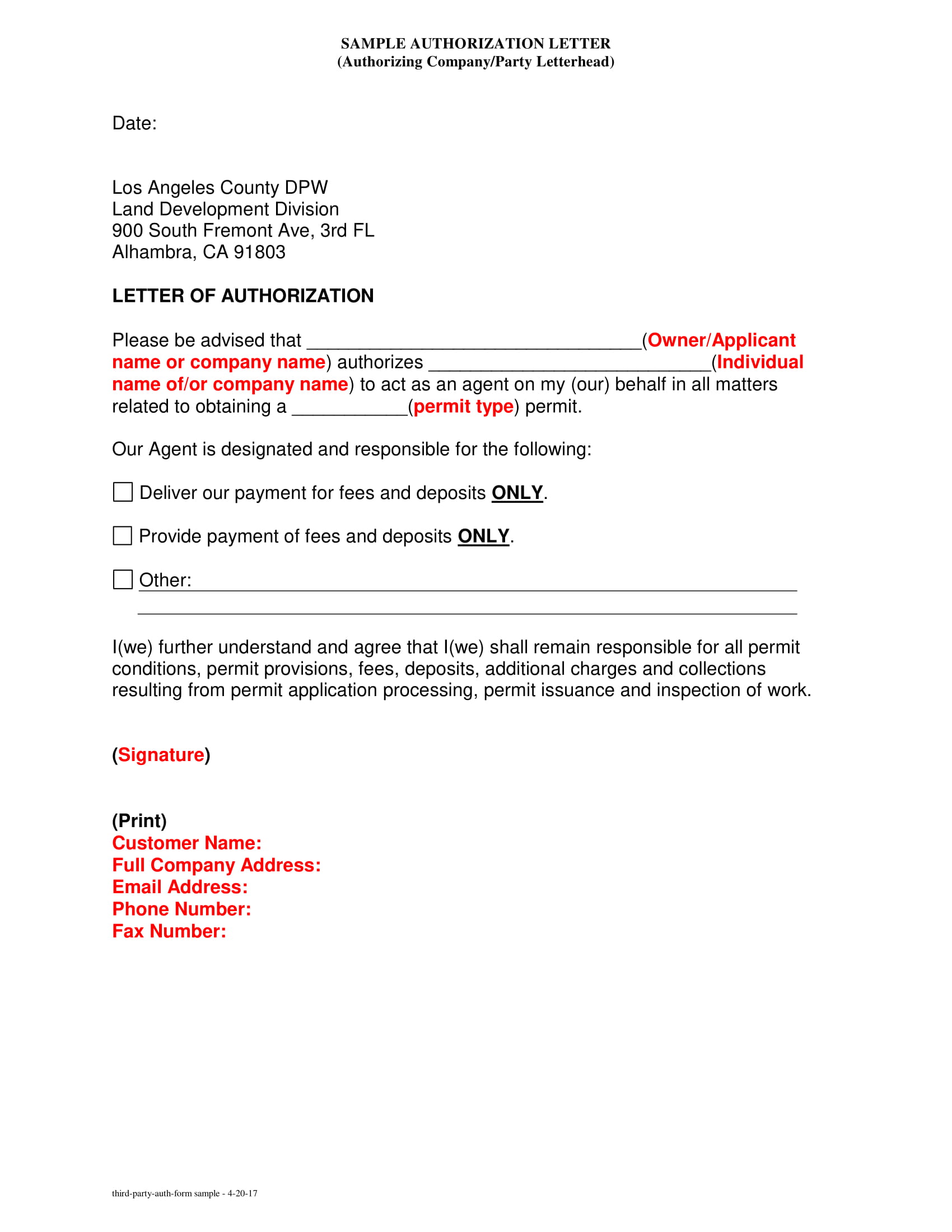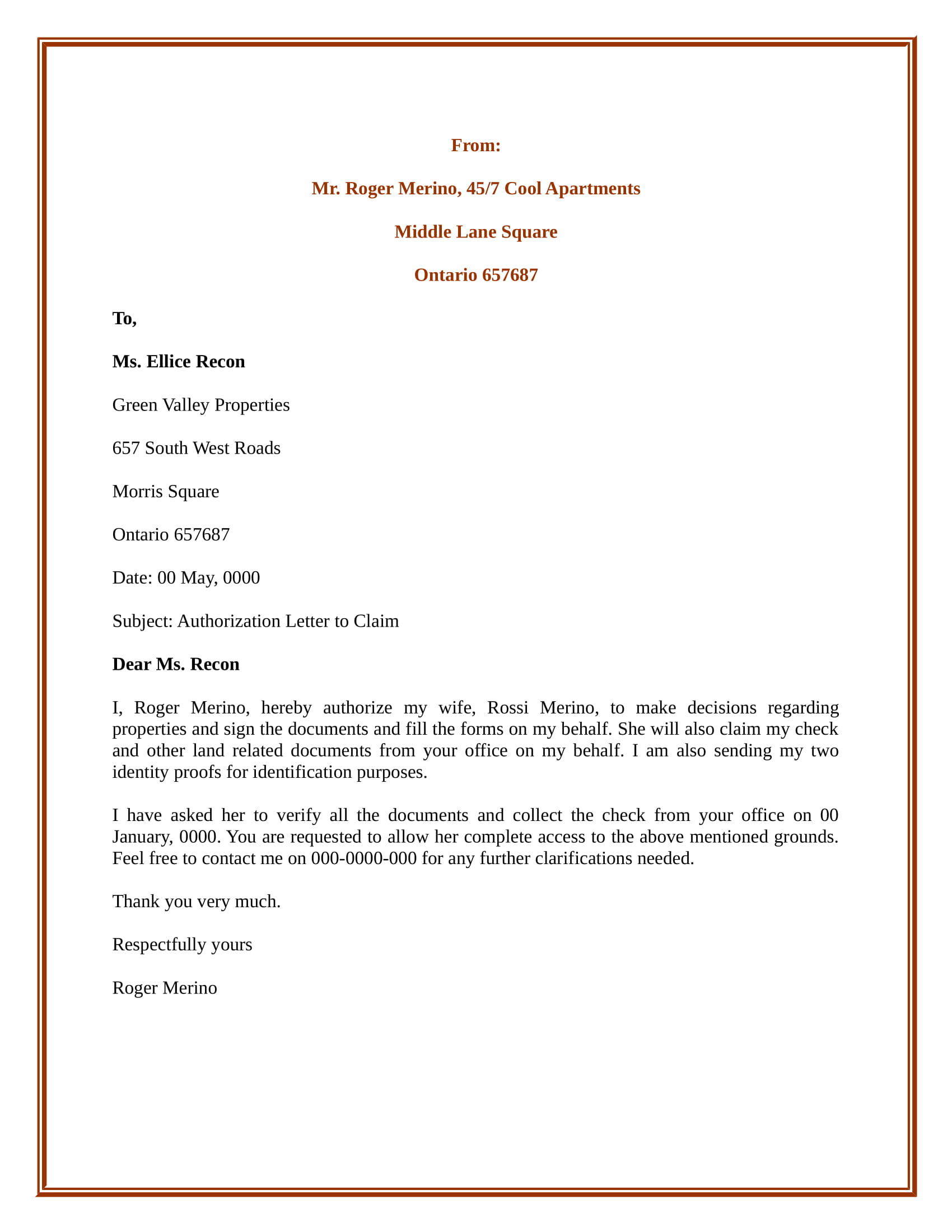Have you ever found yourself in a situation where you needed to access important documents but couldn’t retrieve them yourself? Maybe you were out of town, dealing with a medical emergency, or simply couldn’t make it to the office. In such situations, an authorization letter becomes your lifeline. It’s a formal document that empowers someone else to act on your behalf, especially when it comes to claiming vital documents.

Image: mavink.com
Recently, I realized the importance of authorization letters firsthand. My grandmother needed some crucial medical records from a hospital in another city. Unable to travel, she entrusted me with the task of getting the records. With an authorization letter in hand, I could prove my right to the documents and obtain them hassle-free. This experience highlighted the power and practicality of authorization letters, which can be used in various scenarios.
Understanding Authorization Letters for Document Retrieval
An authorization letter is a legal document granting a designated individual the authority to retrieve documents on your behalf. It is a powerful tool used in different circumstances, including:
Medical records: Obtaining medical records is often a complex process requiring authorization. You might need to grant access to your doctor, lawyer, or insurance company.
Financial records: Your bank, insurance provider, or other financial institutions typically require authorization before releasing financial information to third parties.
Legal documents: If you’re involved in a legal case, you might need someone else to access documents on your behalf. This could involve retrieving court files, property deeds, or other legal documents.
Educational records: When you need transcripts, diplomas, or other academic documents, a properly prepared authorization letter can streamline the process.
These are just a few instances where authorization letters prove useful. Generally, any situation requiring access to official documents, especially when you cannot personally retrieve them, warrants an authorization letter.
Essential Components of an Authorization Letter
To ensure your authorization letter is effective and legally binding, include the following key components:
- Your Name and Contact Information: State your full legal name and provide your current address and phone number.
- Name and Contact Information of the Authorized Person: Clearly identify the individual you are authorizing and include their complete name and contact details.
- Specific Documents to Be Retrieved: Explicitly list the documents you want the authorized person to retrieve. Be as detailed as possible, including the type, date, and any reference numbers.
- Purpose of Document Retrieval: State the reason why you need the documents. This could be for medical purposes, legal proceedings, employment applications, or other specific reasons.
- Date and Signature: Sign and date your authorization letter. Ensure the date is legible and clearly visible.
- Witness (Optional): In some cases, a witness might be required. If so, include their name and signature along with your own.
Tips for Writing an Effective Authorization Letter
When crafting your authorization letter, remember these key tips to make it clear, concise, and legally sound:
- Use Formal Language: Maintain professionalism and clarity in your language, avoiding slang or casual expressions.
- Be Specific: Clearly identify the documents you are authorizing the recipient to access. Avoid vague wording.
- Set a Time Limit (Optional): Consider setting a time limit for the authorization. This allows you to re-assess the need for access if circumstances change.
- Proofread Carefully: Before submitting the letter, proofread it thoroughly for any errors in grammar or spelling.

Image: quizzlibrosa.z13.web.core.windows.net
Authorization Letter Sample to Claim Documents
Here’s a sample authorization letter you can use as a template:
Authorization Letter
To Whom It May Concern,
This letter serves as authorization for [Authorized Person’s Name], residing at [Address] and with phone number [Phone Number], to retrieve the following documents on my behalf:
- [Document 1 Description]
- [Document 2 Description]
- [Document 3 Description]
I require these documents for [Purpose of Document Retrieval]. [Authorized Person’s Name] is authorized to obtain a copy of these documents from your institution.
Sincerely,
[Your Name]
[Your Address]
[Your Phone Number]
[Your Signature]
[Date]
FAQs about Authorization Letters
1. What is the legal significance of an authorization letter?
An authorization letter grants legal permission to an individual to act on your behalf, specifically retrieving documents. It acts as written proof of your consent and can be used to protect both you and the person retrieving the documents.
2. Can I use a generic template or do I need to write a letter from scratch?
While using a template like the one provided is a good starting point, you should always customize it for your specific situation. Include the exact details of the documents, the authorized person, and the reason for retrieval, as well as your signature and date.
3. Does the authorization letter need to be notarized?
Notarization is generally not required for authorization letters. However, some institutions might have specific requirements. It’s always a good idea to confirm whether they need a notarized letter.
4. What if I need to revoke my authorization?
If you need to revoke authorization, send a written notice to the institution holding the documents. Explicitly state that you are revoking your previous authorization and date the notice. Keep a copy of the revocation notice for your records.
Authorization Letter Sample To Claim Documents
Conclusion
Authorization letters are invaluable tools for gaining access to important documents when you cannot retrieve them personally. By understanding the essential components, drafting a clear and concise letter, and following the tips provided, you can ensure your documents are retrieved efficiently and legally.
Let us know in the comments below if you have any other questions or would like more advice on writing effective authorization letters.






